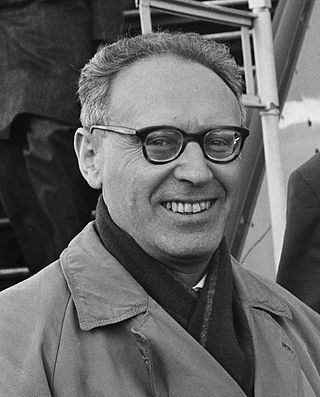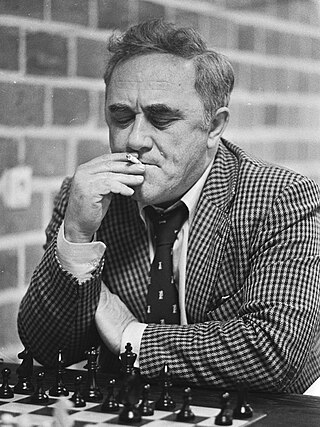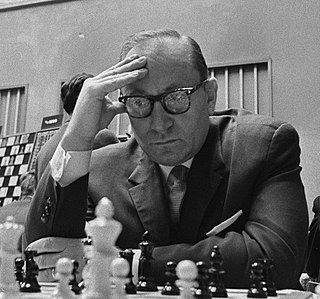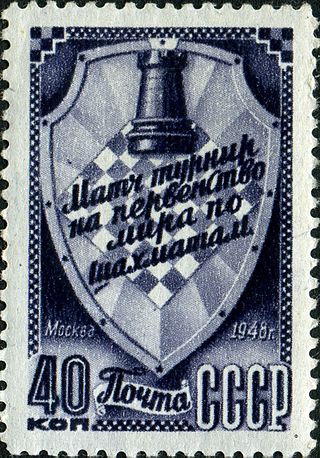
David Ionovich Bronstein was a Soviet chess player. Awarded the title of International Grandmaster by FIDE in 1950, he narrowly missed becoming World Chess Champion in 1951. Bronstein was one of the world's strongest players from the mid-1940s into the mid-1970s, and was described by his peers as a creative genius and master of tactics. He was also a renowned chess writer; his book Zurich International Chess Tournament 1953 is widely considered one of the greatest chess books ever written.

Mikhail Moiseyevich Botvinnik was a Soviet and Russian chess grandmaster who held five world titles in three different reigns. The sixth World Chess Champion, he also worked as an electrical engineer and computer scientist and was a pioneer in computer chess. He also had a mathematics degree (honorary).

Vasily Vasilyevich Smyslov was a Soviet and Russian chess grandmaster, who was World Chess Champion from 1957 to 1958. He was a Candidate for the World Chess Championship on eight occasions. Smyslov twice tied for first place at the USSR Chess Championships, and his total of 17 Chess Olympiad medals won is an all-time record. In five European Team Championships, Smyslov won ten gold medals.

Paul Keres was an Estonian chess grandmaster and chess writer. He was among the world's top players from the mid-1930s to the mid-1960s, and narrowly missed a chance at a World Chess Championship match on five occasions. As Estonia was repeatedly invaded and occupied during World War II, Keres was forced by the circumstances to represent the former Soviet Union and Nazi Germany (1941–44) in international tournaments.

Jørgen Bent Larsen was a Danish chess grandmaster and author. Known for his imaginative and unorthodox style of play, he was the second strongest non-Soviet player, behind Bobby Fischer, for much of the 1960s and 1970s. He is considered to be the strongest player born in Denmark and the strongest from Scandinavia until the emergence of Magnus Carlsen.

Alexander Alexandrovich Kotov was a Soviet chess grandmaster and author. He was a Soviet chess champion, a two-time world title Candidate, and a prolific writer on the subject of chess. Kotov served in high posts in the Soviet Chess Federation, and wrote most of his books during the Cold War. The importance and breadth of Kotov's work rank him among the all-time greats in this field.

Samuel Herman Reshevsky was a Polish chess prodigy and later a leading American chess grandmaster. He was a contender for the World Chess Championship from the mid-1930s to the mid-1960s: he tied for third place in the 1948 World Chess Championship tournament, and tied for second in the 1953 Candidates tournament. He was an eight-time winner of the US Chess Championship, tying him with Bobby Fischer for the all-time record.

Robert Eugene Byrne was an American chess player and chess author who held the FIDE title of Grandmaster (GM). He won the U.S. Championship in 1972, and was a World Chess Championship Candidate in 1974. Byrne represented the United States nine times in Chess Olympiads from 1952 to 1976 and won seven medals. He was the chess columnist from 1972 to 2006 for The New York Times, which ran his final column on November 12, 2006. Byrne worked as a university professor for many years, before becoming a chess professional in the early 1970s.

Anders Gideon Tom Ståhlberg was a Swedish chess player. He was among the inaugural recipients of the title International Grandmaster from FIDE in 1950.

Efim Petrovich Geller was a Soviet chess player and world-class grandmaster at his peak. He won the Soviet Championship twice and was a Candidate for the World Championship on six occasions. He won four Ukrainian SSR Championship titles and shared first in the 1991 World Seniors' Championship, winning the title outright in 1992. His wife Oksana was a ballet dancer while his son Alexander was also a chess master. Geller was coach to World Champions Boris Spassky and Anatoly Karpov. He was also an author.

Isaac Yefremovich Boleslavsky was a Soviet chess player and writer.

László Szabó was a Hungarian chess player. He was awarded the title of International Grandmaster in 1950, when it was instituted by FIDE.

The 1948 World Chess Championship was a quintuple round-robin tournament played to determine the new World Chess Champion following the death of the previous champion Alexander Alekhine in 1946. The tournament marked the passing of control of the championship title to FIDE, the International Chess Federation which had been formed in 1924. Mikhail Botvinnik won the five-player championship tournament, beginning the era of Soviet domination of international chess that would last over twenty years without interruption.

At the World Chess Championship 1963, Tigran Petrosian narrowly qualified to challenge Mikhail Botvinnik for the World Chess Championship, and then won the match to become the ninth World Chess Champion. The cycle is particularly remembered for the controversy surrounding the Candidates' Tournament at Curaçao in 1962, which resulted in FIDE changing the format of the Candidates Tournament to a series of knockout matches.
Lev Solomonovich Aronin was a Soviet International Master of chess. He was a meteorologist by profession.

The 1951 World Chess Championship was played between Mikhail Botvinnik and David Bronstein in Moscow from March 15 to May 11, 1951. It was the first match played under the supervision of FIDE; and the first to use a qualifying system of an Interzonal and Candidates Tournament to choose a challenger - a system which stayed in place until 1993.

A World Chess Championship was played between Mikhail Botvinnik and Vasily Smyslov in Moscow from March 5 to April 27, 1957. Botvinnik had been World Champion since 1948, while Smyslov earned the right to challenge by winning the 1956 Candidates tournament. This was the second World Championship match between the pair, after the drawn 1954 match.

A World Chess Championship was played between Mikhail Botvinnik and Mikhail Tal in Moscow from March 15 to May 7, 1960. Botvinnik was the reigning champion, after winning the World Chess Championship 1958, while Tal qualified by winning the Candidates tournament. Tal won by a margin of 4 points.
Zurich 1953 was a chess tournament won by Vasily Smyslov. It was a Candidates Tournament for the 1954 World Chess Championship, which led to the match between Smyslov and Mikhail Botvinnik. The tournament is famous for the strength of the players, the high quality of the games, and books on the tournament by David Bronstein and Miguel Najdorf that are regarded as among the best tournament books ever written. In May 2022 Yuri Averbakh died at the age of 100, having been the last living player to have played in the tournament.














